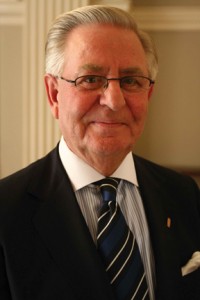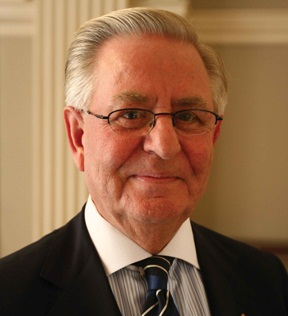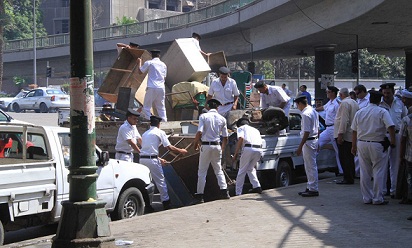
By Philip Whitfield
Let me give you my vision: A man’s right to work as he wills, to spend what he earns, to own property, to have the state of servant and not as master. They are the essence of a free economy and on that freedom all our other freedoms depend.
Regrettably, those are not my words: they were Margaret Thatcher’s, rallying the glum before trouncing Labour. As the Iron Lady was to say later, “The problem with socialism is that you eventually run out of other people’s money.”
It’s noble of President Al-Sisi to donate half his salary and to call on the citizenry to tighten their belts. I’m not against that. But abandoning the privatisation programme, which began in 1991, is addle-headed. Maybe Sisi’s keeping his powder dry. But history shows Egypt’s doomed unless he orders his economic lieutenants to alter course.
And stops them lying. CAPMAS claims the recent 78% petrol hike will increase taxi fares by 3-10 %. Poppycock. Don’t they know the metres have been reset to charge hugely more? Every cab ride I take is 30% costlier than before. Taxi per-hour rates (Cairo EGP 15; Alexandria EGP 25) have doubled. I called a cop over when a Yellow Taxi driver’s metre showed EGP 75 from Mohandessin to Korba in Heliopolis. After midnight, cabbies won’t give anything back from a 20-pound note, even on a 5-pound ride.
The docile Central Bank calmly announces the main goal of its monetary policy is to maintain the stability of prices. How are they doing? Why don’t we organise a trip for them to Metro Markets? My checkout bills are soaring. Meat’s a rarity in my house, and the cat has to fend for herself these days.
The nation’s on what the economist Friedrich Von Hayek (1899 –1992) called The Road to Serfdom. He warned of the danger of tyranny that inevitably results from government control of economic decision-making through central planning.
He further argues that the abandonment of individualism and classical liberalism inevitably leads to a loss of freedom, the creation of an oppressive society, the tyranny of a dictator and the serfdom of the individual.
Like Al-Sisi, Thatcher was the offspring of a shopkeeper. She fastened on to Hayek’s wisdom and put her cabinet colleagues through boot camp to learn the drill. They abandoned socialist public ownership of car factories and airlines and many other publicly owned institutions and took on the trade unions.
Al-Sisi’s locked in a Nasser/Sadat warp. Mubarak’s open-door policy set the cash registers ringing. Once the public has a taste for consumerism there’s no going back. People are no longer wedded to tribal loyalties, dependent on neighbourhood services. Consumers’ spending power changes everyone’s sense of belonging. Trade unionists’ belligerence is toast.
In a free market the consumer is sovereign. They are given the freedom to spend their money, as they wish. Market economies provide the goods and services people want. Government monopolies are dismantled, rogues and rascals exposed. Cronyism is clobbered. Families learn to live with a modicum of credit card debt and take up mortgages to escape suffocating in overbuilt cities such as Cairo.
Inward investment pours in from Japan, the USA, Malaysia, India and Indonesia. Universities overflow with would be capitalists. Places such as the City of London become financial powerhouses.
New cities spring up overnight in consumer-driven societies. Almost everyone can afford a car. Public services shrink as technology kicks in. There’s so much being spent that the government’s purse is soon overflowing.
That’s what’s been happening after socialism was knocked down with the Berlin Wall sending consumerism breezing across Europe. Everyone has the freedom to work, and they spend as they like and work almost anywhere they choose in Europe.
Egypt resembles a maudlin murder of scarecrows. It will never pick up so long as 65% of Egypt’s wealth according to the United Nations is in the hands of 30% of the people and 70% of the population are poor – 25% below the poverty level.
Margaret Thatcher became the poster maiden of politicians all over the world. They urged their recalcitrant Luddites to spend, spend, spend, as Vivian Nicholson famously said after winning $5m on the football pools in today’s money.
It’s the motor of Angela Merkel’s success. It’s what Ukrainians want: Kick the commies and cronies out. It’s why Vladimir Putin’s hugely popular with the majority of Russians, purging the old guard in the Kremlin and ending the oligarch’s high jinx. His new market economy is abolishing serfdom on the steppes.
The autocrats running most of the Middle East, the kings, emirs and sheikhs would be chopped liver if free-marked-led democracy paid a courtesy call on their palaces. Gone would be their privileges and their grip on the oil and gas revenues they squander in Harrods. It would expose the sanctimony enwrapping their humbug.
Sisi is the most well educated president Egypt has had. He knows this stuff. For the moment, his to-do list is topped by security and stability. It’s a tough task. But he’ll weather it, though it will take some time to cut the insurgents down to size.
There’s a management principle he might consider: promoting value as the sum of quality, service, reliability and price. And results judged against the time and effort expended. Bonuses kick in if value is achieved (according to the customer) and the result is profitable (according to the employer).
I’m engrained in that the system. In Cairo a protégé is on her way to becoming a millionaire establishing the TripAdvisor of the auto repair industry. Given a fair wind rogue mechanics will be identified and snubbed and the roads will be much safer.
Now come with me to a big construction project on the Nile Corniche near the National Bank HQ. It’s been on the go for years and shows no sign of an early finish. Meet the construction boss, an old hand from the UK. He tells me bonuses kick in back in Blighty when the guys cementing breezeblocks lay 200 per square metre a day. On most British sites, they do that before lunch. In Cairo, the maximum he’s got out of the workforce is 21 in a day.
They’ve no incentive to work harder, only to stay on the job for as long as they can stretch the project out. That mirrors the reports on productivity in Egypt, which is 5% of productivity in Europe or the USA.
There’s no incentive to work properly in Egypt. A plumber came to fix a leaky tap. He came. He went. Shiny new knobs twirled. I was out a couple of hundred. An hour later the taps were spinning freely. And there was no hot water. He came back and whacked the taps with a hammer. (A tenner). He’s been called back six times to fix his mess. After a week of cold showers, and money pouring down the drain, I suggested a spanner. Wonders never cease. The wretch wielded the wrench: waves welled. Whitfield? One warbling warm-water wallower.
“Tell me and I forget. Teach me and I remember. Involve me and I learn,” Benjamin Franklin.
Philip Whitfield is a Cairo commentator.




